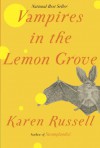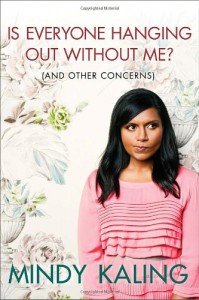More Good Books Than Grains of Sand
lifetime book-lover who writes about - what else? - a variety of books.
Currently reading
"What We See When We Read" by Peter Mendelsund
 1
1
the bone clocks: razzle-dazzle in the shallow end of the pool
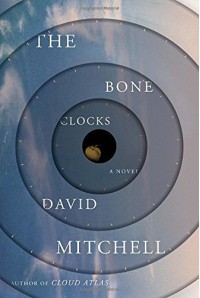
this was one of those "i really wanted to like this book" kind of novels, because i really wanted to like this book. i've been wanting to read David Mitchell, he of the Cloud Atlas novel everyone seems to love, for years now. in fact, i've had Black Swan Green on my shelf for almost ten years, just waiting for the perfect time when i'm in the right mood for an especially well-written coming-of-age novel told from the perspective of a precocious child.
i have no doubt that i would have gotten around to it eventually, but unfortunately i tend to get distracted by new things, and The Bone Clocks was just too much to be ignored, especially since (1) it was an entry in the Tournament of Books, (2) i received my very own signed, special edition copy through my Indispensible subscription at Powell's Books, and (3) i was really in the mood for an epic science fiction novel with a high literary quality. so The Bone Clocks it was. and . . . disappointingly, i found it just "okay."
reading The Bone Clocks was like jumping off of a diving board fully expecting to hit the deep end of the pool, and encountering the bottom of the shallows instead. the novel is composed of six interconnecting novellas, and each one increasingly taxed both my enjoyment and my patience.
but first, a brief summary: the first (and, in my opinion, best) chapter introduces Holly Sykes, a teenage girl who has a weird younger brother, frequent visits from strange people, and a no-good, lying, cheating boyfriend. one day, our heroine finds herself in the middle of an invisible war that's been raging between the anchorites and the horologists, two small factions of people who, through very different methods, live centuries-long lives. each novella is then told from the perspective of someone who intersects with Holly's life, and we see hints of this invisible war until the fifth chapter when almost everything is explained.
so, Mitchell is a technically great writer. he is unquestionably skilled at the magical art of using the right words in just the right place to maximum effect. each novella purposefully occupies a different genre: the coming-of-age novel, the crime novel, the war novel, and the post-apocolyptic world novel, to name a few. and, for the most part, Mitchell occupies these genres very well. this is a writer who clearly understands the craft of writing, and in these chapters, it shows.
but then there's the aforementioned fifth chapter, which i guess is the badly-written, science fiction novel because yeesh. it was bad. cringingly bad, and it doesn't really matter if it's bad on purpose or not because either way, it does not reflect well on Mitchell or on this book. for what it's worth, i think it is here that we finally see Mitchell tackling a genre that he fundamentally does not understand. whenever an author is frequently using words and phrases like "psychoduel" and "transverse" and "psychosoteric" and "carnivorous psychodecanter" with a straight face, they really should step back and reevaluate what they're doing and why. seriously, my eyes were about to roll out of my head.
Mitchell's clumsy handling of the fifth chapter was not helped by the fact that I was reading Neil Gaiman's Trigger Warning at the same time, and by comparison the fifth chapter was not just bad, but bordering on offensive. it was as if Mitchell wrote the chapter to prove to himself and to others that he could write it, but not because he has any real respect for the genre, and it showed.
but, my biggest problem with The Bone Clocks wasn't with the fifth chapter. it was with the story as a whole. the structure and the writing is so razzle-dazzle that it's easy to overlook the fact that, in the end, the story is really rather shallow. it certainly didn't require 600 pages in the telling. but the way that Mitchell wanted to tell the story did, because Mitchell obviously wanted to showcase all those genres he can write in. which, maybe that works for some readers when the writer is as technically skilled as Mitchell. but for me, without the grounding of a real, substantive story, the whole enterprise came off as annoyingly show-offy and mildly pretentious.
in an earlier post, i wondered if all the plot in this book was going somewhere. conclusion: it doesn't. i also hoped that the book got better, as i was told. conclusion: it didn't. in fact, for me, it got worse. so no, this will not be going on my list of favorite books of 2015. i don't think i'll be reading Cloud Atlas anytime soon either, but i still hold out hope that i may find myself in the mood for Black Swan Green some time in the future. something less sprawling might be more to my liking.
3.5 out of 5 grains of sand. i can't recommend this, but if you're still intrigued, you should read the more positive reviews. many, many people loved this novel - fifth chapter and all.
 2
2
the shining girls: time-travelling serial killer

The Shining Girls had a strong ending, which bumped this from a three to four star book for me. the plot: a serial killer, Harper, uses a mysterious house to travel through time to kill girls who "shine." here, "shine" seems to mean girls with special potential and energy. Harper's home of operation is Chicago, which is expertly evoked by Beukes. the city in all its grittiness, beauty, and potential really comes alive in The Shining Girls - a pretty great feat since Beukes is herself from South Africa. as Harper travelled through time hunting his next victim, i was usually more interested in the city than I was in how Harper would claim his next shining girl.
and, as to that . . . my god, this book was graphic. i learned something about myself: i am not into reading graphic descriptions of women being gutted alive. i can stomach one or two such scenes per book, but not eight or nine. those scenes were so deeply unpleasant that picking up The Shining Girls became a chore. it was easily my least favorite part of this novel, which is unfortunate since it's such an essential part of the story.
as with all time travel narratives, if you think too much about the cause and effect mechanics of this book, you will loose hours only to find yourself right back where you began. but not coincidentally, i think, this circular thinking very much mirrors the structure of the novel where you end essentially end where you began. Buekes wants us to question the nature of cause and effect, and it is one of the strongest aspects of this novel.
another saving grace of The Shining Girls: our heroine, the one who survives a brutal attack by Harper, Kirby. she's very Lisbeth Salamander-esq in a good way. she's a survivor, prickly and punky, but she didn't feel like an archetype when she easily could have. i enjoyed her character, particularly when she's interacting with Dan, her cynical and much older sidekick.
the graphic nature of the violence just didn't do it for me. but to those for whom that's not a concern, i'd recommend The Shining Girls. it's an atmospheric novel which raises some interesting questions about time and inevitability. and, while The Shining Girls wobbles in the execution a little, it definitely sticks its landing.
the tournament of books: my favorite time of the year!

i love the literary discussion that happens every year during The Tournament of Books. there's no better literary conversation happening anywhere else on the internets right now. it's a complete time-suck, but so very worth it.
if you've never heard of this fantastic event, a brief description from the website:
Each weekday in March, two works of fiction will go head to head, with one of our 16 judges choosing one to move ahead in the brackets. Along the way, each judge reveals his or her biases and interests, any connections they have to the participating authors, and, most importantly, an elaborate explanation of how they decided between the two books.
. . . .
From the eight opening round matches to the four quarterfinal matches through the two semifinal matches, the original field of 16 competitors is whittled down to two books. However, before those books can enter the final, championship match, they must compete in the Zombie Round, which brings back two books that were eliminated during gameplay.
. . . .
The two books that emerge victorious from the Zombie Round enter the championship match, which is decided by all 16 judges plus an additional tiebreaker judge. Each judge picks their favorite of the two final books, and the book that receives the most votes takes home that year’s Rooster.
today's match-up was last year's literary juggernaut, All the Light We Can Not See versus the small, indie print Wittgenstein, Jr. i haven't read either (i have All the Light on my TBR shelf), but i've had so much fun reading the commentary about WWII books, and idle intellectuals that it doesn't even matter. you'll discover new books and have your opinions about the books you have read challenged and shaped. it's a book club of the highest order, and i wouldn't miss it for the world.
 2
2
Reading progress update: I've read 202 out of 368 pages.

the (maybe) reading funk strikes again? perhaps. because this one has become a chore. the string of brutally (and graphically) attacked dead girls is getting old. quickly.
to be fair, i don't think it's completely The Shining Girls' fault. i've just reached my limit of our cultural pre-occupation with dead women. i've recently seen too many movies and watched too many tv shows with dead women as a central character or plot device. i need to mix things up, i.e. i need to add a different book to my reading rotation. maybe, i'll start enjoying this more, if i do.
 1
1
Reading progress update: I've read 375 out of 624 pages.

maybe it's me. maybe i'm in a reading funk, and don't really know it. but while i can appreciate Mitchell's writing - it's sleek and polished and frequently inter-sped with beautiful bursts of poetic description - i can't help but wish he would get to the bloody point already.
i'm a little past the halfway point, and i still don't know where all this plot is going, or even if it is going somewhere. if it is, it's going about its business very slowly.
a recurring thought: all these people - in particular, these men through which most of the story has been told - really seem to care about holly. am i supposed to care about her too? because, although she frequently pops up as a side-character in someone else's story, i kinda don't.
but then, maybe this is all intentional. maybe the structure of this book is trying to mimic the circular maze at the heart of the story by making its labyrinthine way to the middle (the main plot) through the eyes of selfish men who care, in their way, about holly at some point in their lives (this pattern is getting a little tiresome, but that's another post for another day).
and . . . i sound snarky. i don't mean to sound snarky. it's not a chore reading The Bone Clocks. it's just not a joy either. right now, i'm reading it because it want to finish it, but not particularly because i can't put it down. i'm told it gets better. here's hoping.
 1
1
Reading progress update: I've read 26 out of 308 pages.

sigh. Neil Gaiman is so rude. i was all set to read Kevin Brockmeier's collection of short stories, A View from the Seventh Layer: Stories. but then Gaiman came along with his fancy new collection, and knocked Brockmeier right off the "currently reading" list.
i've had Brockmeier's book on my shelf for years - ever since i finished A Brief History of the Dead. but i've been waiting years for this collection from Gaiman. i discovered Gaiman through his short story collections, and i can't wait to discover him again with this new book. and then it'll be back to Brockmeier, who's no slouch either when it comes to stories from an author possessed of a remarkable imagination.
Reading progress update: I've read 83 out of 594 pages.
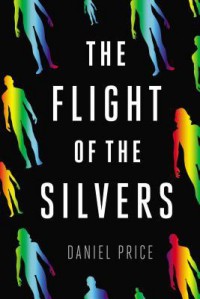
so, at 594 pages, this is a door-stop of a hardback book, and i still have a long way to go. but last night, as i (finally) finished Annihilation, i thought about how poorly Annihilation compared to this novel. it struck me that Annihilation is a kind of horror/sci fi novel that failed to frighten or disturb me in the slightest, although i think it's clear that was at least part of what Vandemeer was trying to do.
The Flight of the Silvers, on the other hand, has thus far had very little to do with horror or creepiness. and yet there's an event in the beginning of The Flight of Silvers that i found so utterly terrifying that it gave me nightmares - and i really do mean that in the plural sense. i obviously can't recommend the novel yet, but i would definitely recommend the first 70 pages if you want to see what an apocalypse that happens in the span of a few hours looks like. it's riveting stuff.
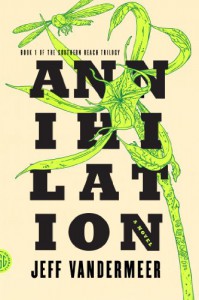
this was like reading a long recounting of someone's very vivid, incredibly strange dream. it's all very wispy, and dream-like, and weird in a vaguely menacing way, and my god, i hated it. i couldn't wait for it to end, frankly.
it seemed abundantly clear to me early on that i wasn't going to learn anything of substance about the mysterious Area X, (I suspect - i hope - things become more clear in the other two books), nor did i particularly care about any of the characters. now i'm not the kind of reader who has to like her protagonists, but i should at least care how their story will unfold, otherwise why am i here? and i just didn't care, here. in fact, i wanted them all to go away, however vaguely Vandemeer chose to describe their demise.
for such a short book, i found it incredibly oppressive. perhaps that was the point - to give the reader a sense for how it would feel to actually be in Area X. if that's the case, then mission accomplished. i found this book so oppressively boring in the end (really, how interested would you be if someone took days of your life to describe their weird dream to you?), that i have no desire to volunteer for another disastrous expedition to Area X by reading the other two novels. i intend to stay far, far away.
so. not recommended. but, as i said before, many, many people really liked (alert: spoilers) this book and the trilogy as a whole. so maybe there's something that i'm just not getting. as it stands, i truly don't like books where a lot happens, but nothing really happens at all - which is what happened here. bleh. i'm just happy i can now move on to more enjoyable things...
 3
3
Reading progress update: I've read 100 out of 195 pages.

i'm trying really hard with this book. really, i am. but this happens to be one of the most soporific books i've read in a really long time. i can't seem to help it. every five pages or so and there I go again, dozing off. . . i can't say it's a bad book, but in the end, i might just say it's boring. which doesn't feel right because so many people seem to have really enjoyed it. i'm hoping things get better, but if it doesn't i'm just thanking my lucky stars that it's a short book and i only have 95 more pages to go.
gone girl: the creepiest thriller i've read in a while

ok, so maybe i'm the last person on the planet to read this, but i'm a before or after-the-hype kind of reader anyway. so this book was good. like, i can't put it down good. like there-is-a-horrible-car-crash-and-i-can't-look-away good. because, i mean this book has one of the most frightening antagonists i have ever read. i won't name any names (for the sake of that one other person who hasn't read it), but one of these characters is crazy, and i don't think an author has ever placed me in the head of a sociopath quite as skillfully or as fully as Flynn. this character made my skin crawl, and it was awesome and awful.
Flynn's a great writer, but that ending. that ending. i didn't hate that ending, but i didn't feel completely satisfied by it either. i know how i would have wanted it to end - the antagonist is poetically brought down by their own arrogance and self-conceit - but alas, Flynn had other ideas and it's her story and her prerogative. so, c'est la vie. i'd read it again (if i had the time), and i'd definitely recommend it. it's an experience, albeit one that might leave you shuddering in psychological disgust days after you've finished it.
now. finally, i get to watch the movie.
Reading progress update: I've read 264 out of 418 pages.

a long time ago, i read and immensely enjoyed John Connolly's The Book of Lost Things (which i highly recommend if you're a fan of Neil Gaiman's Stardust, or of modern-day stories infused with fantasy and fairy tales), and Nocturnes, a collection of horror short stories. Connolly is a propulsive and magical writer who could make a list of ingredients seem fascinating and infused with magic and hint of doom. so after i'd exhausted myself of Connolly's two standalone books, i turned an inquisitive eye toward his Charlie Parker series, a long-running one even then that promised many hours of thoroughly transporting writing.
unfortunately, i was turned off by the many descriptions of the series as "dark." and this seemed to be an accurate description since the protagonist's family is murdered by a serial killer in one of the early books (i think - the basic facts are true but i'm not sure of the timeline). in any case, "dark" plus "murdered family" plus "serial killer" put me in the mind of that Brad Pitt thriller "Seven", so i reacted with all kinds of NO THANK YOUs. for the most part, i tend to like my "dark" with a smidgen of good humor, and light on the hopelessness and depression. (seriously, "Seven" gave me nightmares and i enjoy horror movies on a regular basis).
that's all to say that it's taken me all of seven years to finally pick up a Charlie Parker novel, and i am ever so happy that i have. i don't know about the other books (i will soon if my enjoyment of this installment is any indication), but The Wolf in Winter is plain supernatural thriller fun. i'm enjoying every page of it. it has reminded me all-to-clearly why i enjoyed Connolly's writing, and if the other books in the series are just as good, i won't be taking another seven year hiatus.
 2
2
The Martian (otherwise known as "You Must Read This")

this will be one of the best books you read this year, or any year.
the plot is simple: astronaut mark watney is left for dead on Mars due to a freak accident. he now has two very complicated jobs: stay alive, and figure out how to get the hell off of Mars. the rest is pure, unadulterated suspenseful fun. honestly, some of the technical, scientific explanations were way over my head (hey, i majored in the humanities - English - for a reason), but i still enjoyed virtually every aspect of this book.
watney is an impeccably drawn character, and its not hard at all to root for him to live. if i were stuck on a Mars, i'd pick watney to be stuck with any day - and that's not just because he knows how to Macgyver the shit out of some NASA equipment. his sense of humor is phenomenal. and when you're in a "i'm stranded on a remote, inhospitable desert of a planet that might kill me at any moment if i don't starve to death first" kind of situation, a sense of humor is a requirement.
highly recommended.
p.s. of course, they're making a movie because of course! starring matt damon, and co-starring umm... everybody? Jessica Chastain, Jeff Daniels, Kristen Wiig, Michael Pena, Kate Mara, Sean Bean, Donald Glover, and Chiwetel Ejiofor. Coming to a theatre near you this time next year. i'll be one of the first in line, but you should read the book first. seriously, it's that good.
Reading progress update: I've read 107 out of 295 pages.

this book is an absolute delight and, so far, definitely as funny as it says in the blurbs. i can see why they're turning this into a film.
i want to read ALL the books.
i'm living one of those moments right now when i just want to read all the books. at once. right now. usually, i manage to restrain myself. but every once in a while, i say to hell with it and open up every single book that's calling my name. this is one of those whiles. so i'm loading up my "currently reading" pile with seven books, and i can't even feel bad about it. who has time to feel bad when there's so much to read?
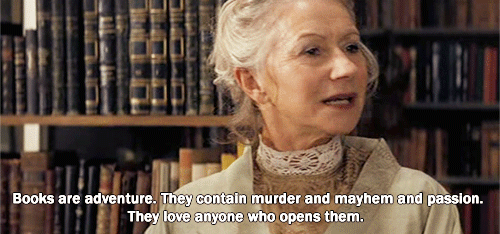
and for this, we love them back.





